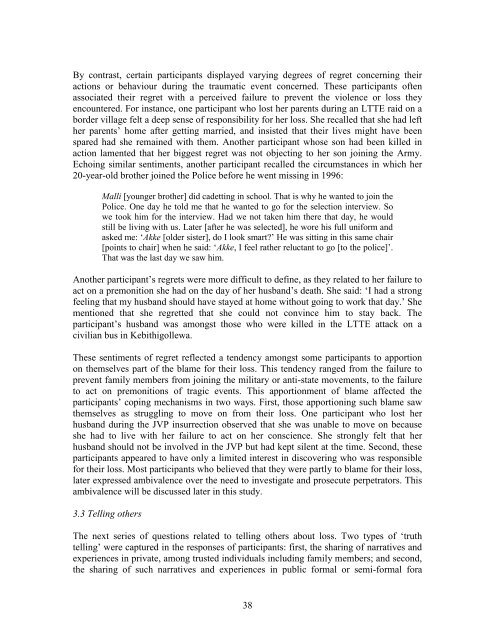Confronting the Complexity of Loss
truth memory justice_final- 11st sep 2015
truth memory justice_final- 11st sep 2015
- No tags were found...
You also want an ePaper? Increase the reach of your titles
YUMPU automatically turns print PDFs into web optimized ePapers that Google loves.
By contrast, certain participants displayed varying degrees <strong>of</strong> regret concerning <strong>the</strong>ir<br />
actions or behaviour during <strong>the</strong> traumatic event concerned. These participants <strong>of</strong>ten<br />
associated <strong>the</strong>ir regret with a perceived failure to prevent <strong>the</strong> violence or loss <strong>the</strong>y<br />
encountered. For instance, one participant who lost her parents during an LTTE raid on a<br />
border village felt a deep sense <strong>of</strong> responsibility for her loss. She recalled that she had left<br />
her parents’ home after getting married, and insisted that <strong>the</strong>ir lives might have been<br />
spared had she remained with <strong>the</strong>m. Ano<strong>the</strong>r participant whose son had been killed in<br />
action lamented that her biggest regret was not objecting to her son joining <strong>the</strong> Army.<br />
Echoing similar sentiments, ano<strong>the</strong>r participant recalled <strong>the</strong> circumstances in which her<br />
20-year-old bro<strong>the</strong>r joined <strong>the</strong> Police before he went missing in 1996:<br />
Malli [younger bro<strong>the</strong>r] did cadetting in school. That is why he wanted to join <strong>the</strong><br />
Police. One day he told me that he wanted to go for <strong>the</strong> selection interview. So<br />
we took him for <strong>the</strong> interview. Had we not taken him <strong>the</strong>re that day, he would<br />
still be living with us. Later [after he was selected], he wore his full uniform and<br />
asked me: ‘Akke [older sister], do I look smart?’ He was sitting in this same chair<br />
[points to chair] when he said: ‘Akke, I feel ra<strong>the</strong>r reluctant to go [to <strong>the</strong> police]’.<br />
That was <strong>the</strong> last day we saw him.<br />
Ano<strong>the</strong>r participant’s regrets were more difficult to define, as <strong>the</strong>y related to her failure to<br />
act on a premonition she had on <strong>the</strong> day <strong>of</strong> her husband’s death. She said: ‘I had a strong<br />
feeling that my husband should have stayed at home without going to work that day.’ She<br />
mentioned that she regretted that she could not convince him to stay back. The<br />
participant’s husband was amongst those who were killed in <strong>the</strong> LTTE attack on a<br />
civilian bus in Kebithigollewa.<br />
These sentiments <strong>of</strong> regret reflected a tendency amongst some participants to apportion<br />
on <strong>the</strong>mselves part <strong>of</strong> <strong>the</strong> blame for <strong>the</strong>ir loss. This tendency ranged from <strong>the</strong> failure to<br />
prevent family members from joining <strong>the</strong> military or anti-state movements, to <strong>the</strong> failure<br />
to act on premonitions <strong>of</strong> tragic events. This apportionment <strong>of</strong> blame affected <strong>the</strong><br />
participants’ coping mechanisms in two ways. First, those apportioning such blame saw<br />
<strong>the</strong>mselves as struggling to move on from <strong>the</strong>ir loss. One participant who lost her<br />
husband during <strong>the</strong> JVP insurrection observed that she was unable to move on because<br />
she had to live with her failure to act on her conscience. She strongly felt that her<br />
husband should not be involved in <strong>the</strong> JVP but had kept silent at <strong>the</strong> time. Second, <strong>the</strong>se<br />
participants appeared to have only a limited interest in discovering who was responsible<br />
for <strong>the</strong>ir loss. Most participants who believed that <strong>the</strong>y were partly to blame for <strong>the</strong>ir loss,<br />
later expressed ambivalence over <strong>the</strong> need to investigate and prosecute perpetrators. This<br />
ambivalence will be discussed later in this study.<br />
3.3 Telling o<strong>the</strong>rs<br />
The next series <strong>of</strong> questions related to telling o<strong>the</strong>rs about loss. Two types <strong>of</strong> ‘truth<br />
telling’ were captured in <strong>the</strong> responses <strong>of</strong> participants: first, <strong>the</strong> sharing <strong>of</strong> narratives and<br />
experiences in private, among trusted individuals including family members; and second,<br />
<strong>the</strong> sharing <strong>of</strong> such narratives and experiences in public formal or semi-formal fora<br />
38



